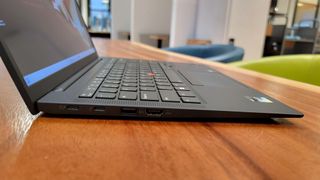Sales of PCs have been going down globally in the past couple of quarters due to inflation and increasing prices, geopolitical instability, and the end of the coronavirus rally. But in Russia, there were other reasons behind dropping PC sales: big PC brands and component vendors left the country, major brands left off, and everyone began to save. Yet, some companies thrive even amid a 20% year-over-year unit sales drop in 1H 2022. Lenovo seems to be among them.
Lenovo topped the list of PC suppliers with 95,000, up 3% units sold in 1H 2022 (up 3%, presumably year-over-year), after formally leaving the Russian market earlier this year, according to analysts from Marvel, a major distributor of PCs and hardware. It was followed by HP with 80,000 units, down 93%. The No.3 was a major Russia-based whitebox maker Aquarius with 61,100 units. The latter got a 215% sales increase, the company says. Traditionally the market was dominated by Dell and HP.
Sales of PCs in Russia in the first half of 2022 reached 1.18 million units, according to analysts from Marvel, a major distributor reports Vedomosti (opens in new tab). That's down around 20% from the same time in 2021, based on the data from Marvel, a major distributor. Unfortunately, we only have this kind of data since Gartner and IDC ceased to monitor this market after Russia's invasion of Ukraine on February 24.
All the top PC makers — Lenovo, HP, Dell, Apple — left Russia after the nation started the war. Yet the numbers speak for themselves: HP's sales were halved in 1H 2022, but Lenovo's shipments were up. It is hard to tell whether Lenovo omitted any rules here, given that it officially left the country in May. So we are dealing with numbers from the first half of the year (no, IDC and Gartner do not cover Russia's PC market, so we do not have data outside of what Marvel kindly provides).
We have comments from a grey box PC supplier from Russia, who says that demand has at least doubled.
"As for Aquarius, our revenue increased by 215% [over three quarters of 2022]," said Vladimir Stepanov, the head of Aquarius, in an interview with Vedomosti.
Meanwhile, Marvel has hard times with the third quarter data, given consumer and business behavior, particularly in Russia, and global dynamics.
"It is quite difficult to presume results of the third quarter, as we see a combination of multidirectional factors," analysts from Marvel wrote to Vedomosti. "On the one hand, there is decreasing business activity, but on the other hand, there is an increase of [graphics cards availability at lower prices] due to a serious decrease [of interest from miners]. [Meanwhile there is a question] whether large customers managed to adapt to new realities."

